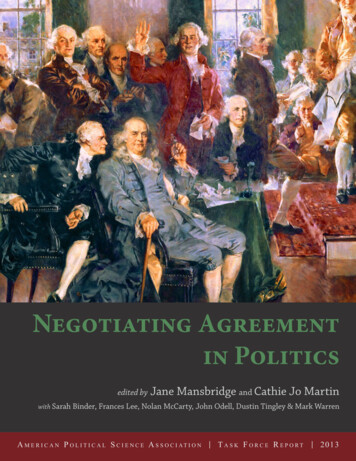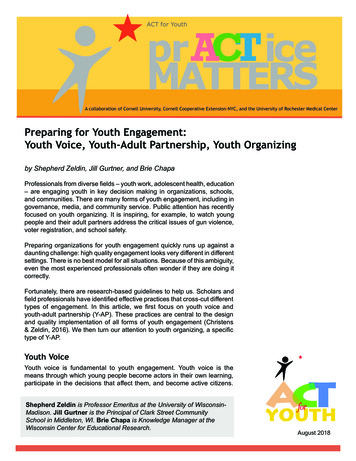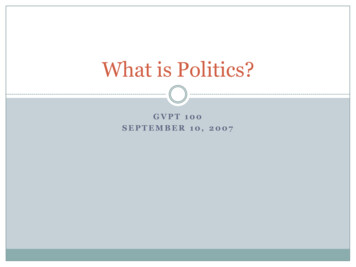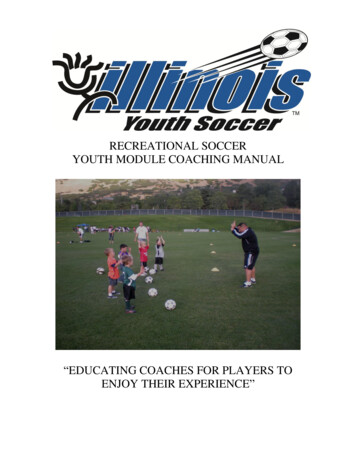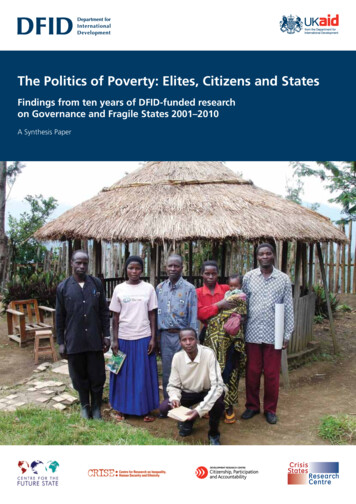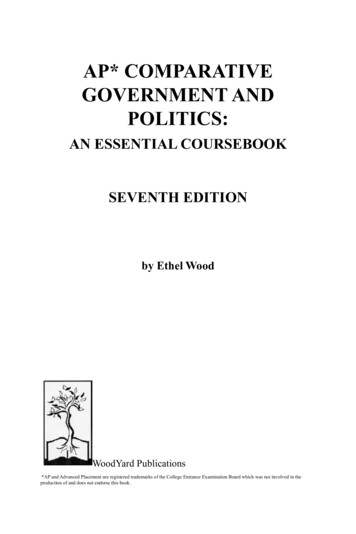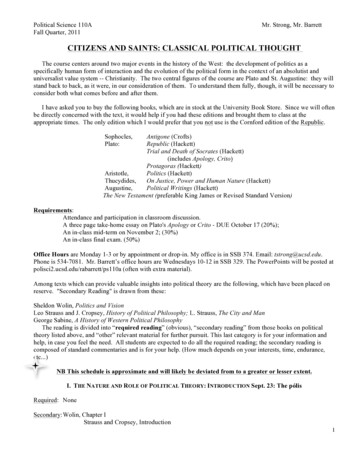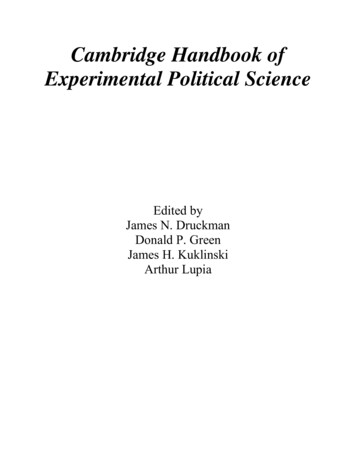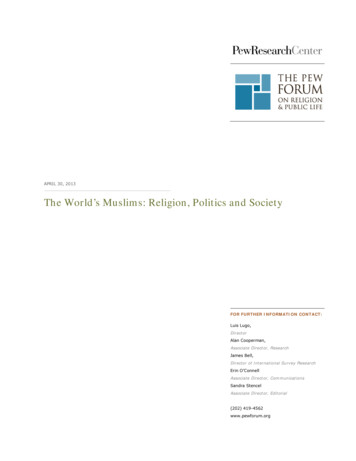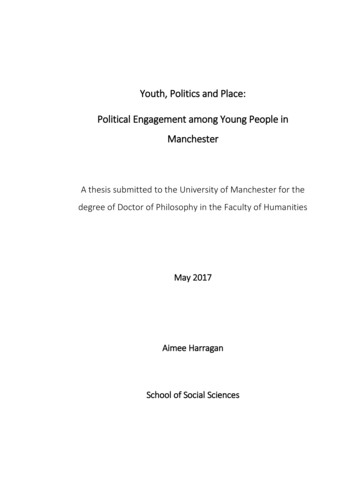
Transcription
Youth, Politics and Place:Political Engagement among Young People inManchesterA thesis submitted to the University of Manchester for thedegree of Doctor of Philosophy in the Faculty of HumanitiesMay 2017Aimee HarraganSchool of Social Sciences
List of ContentsList of Figures and Tables6Abstract7Declaration8Copyright Statement8The Author9Acknowledgements9Chapter One: Situating the ProjectRationale and Context of the Project10Working Towards Conceptual Clarity10Structure of the Thesis1215Chapter Two: Young People as (In)Adequate CitizensIntroduction17Inadequate and Apathetic Young Citizens17Electoral and Formal Politics17Young Citizens and the Anti-Apathy Consensus17Engaged Sceptics22Critical Citizens23Anti-Politics and Standby Citizens24Advancing Understandings of Young People’s Politics25Young People as Different, not Deficient Citizens28Young People as Real Citizens31Pursuits of the Political402
Conclusion4552Chapter Three: Seeking and Finding Young People and theirPolitics in the LocalIntroduction54Lessons from the Literature for a Methodological Approach54Research Design54Research Questions56The Value of Ethnography57Observing and Interviewing Young People57Ethical Considerations59The Practicalities and Practice of Fieldwork: Getting in, Getting on,Getting outGetting In: Selecting Trafford as the Fieldwork Site6062Fieldwork Groundwork62Getting On: Data Collection64Sensitivities66Data Summaries70Overview of Participants70Gender, Class and Ethnicity Dynamics72Getting Out: Exiting the Field77Data Analysis80Reflections80Conclusion8283Chapter Four: Mapping ‘Political’ ActivityIntroduction85What young people in Trafford do853
Young People’s ‘Political’ Activities and Narratives in Trafford85Political Parties94Activism Networks95Youth Cabinet96Apolitical Political Activity98What Politics Means101Understandings of politics versus Politics102Political Knowledge and Literacy108Mock Elections and the General Election112Conclusion115118Chapter Five: The Do-ers and the ‘Nothings’Introduction121Community and Civic Activities121General Community Groups121Voluntary Roles through Schools122Voluntary Roles Outside of School123General and Social er Six: Everyday Experiences of Youth in ContextIntroduction143Stereotypes143Young People’s Use of Space143Misconceptions of Youth and Community147Budget Cuts: Perceptions of Provision149Youth Club Closures1524
The Use and Perceptions of Youth Clubs154“Spread the word about community”159Conclusion168169Chapter Seven: Activity as Identity, Purpose and PowerIntroduction173Types and Labels in Participating173Opportunities: Schools, Types and Choice173Power and Purpose178Youth Trust Conference182Negotiating Youth Identity182Meaningful Engagement186Recognising the Political189Conclusion192195Conclusion: Recognising Competent CitizensContribution of the Thesis198Finding the Interesting in the Mundane198Reflections on the Thesis199Future Implications: Beyond ‘Youth’, to Recognition as Citizens207Conclusion209211Appendix 1: Fieldwork LogBibliographyFinal word count: 80, 4195213216
List of Figures and TablesFigure 1: Trafford Wards63Table 1: Research Sites67Table 2: Data Summary71Table 3: Participant Biographical Information74Figure 2: Research Sites and Reported Residences in Trafford (Google2017)79Figure 3: Screenshot of Youth Zone Website87Table 4: Overview of the Activities of Young People in Trafford89Graph 1: Distribution of Activeness93Figure 4: Youth Cabinet’s ‘Understanding Politics’ Mind-MappingQuestions103Figure 5: Group A, Question 1104Figure 6: Group B, Question 1105Figure 7: Group A, Question 2106Figure 8: Group B, Question 2107Figure 9: Youth Conference Mapping Exercise (a)183Figure 10: Youth Conference Mapping Exercise (b)184Figure 11: Young People’s Mind Map for the Youth Club1916
AbstractThis thesis presents a consideration of the ways in which the experiences and meanings ofyoung people’s activities contribute to their positioning towards the political, and as suchgive the political meaning (McNay 2014; Hay 2007; Arendt 1958). This thesis takes aqualitative, locally embedded approach to understand the ways in which young peopleengage politically, in Manchester. The project was set against the backdrop of the 2015General Election, the EU referendum and the impacts of austerity in the form of serviceclosures in the community. Observing and speaking to young people directly exposedsome of the many ways in which they take part, in everyday settings. Their participation invarious spheres of their community was supported by a number of different rationales.Hence, the everyday approach of this project highlights the ways in which participationmatters, politically, to young people when they are contributing to their communities. Thiswas found to be quite distinct from their largely negative narratives and relationships withformal politics. The understanding of the political for young people centres on establishinga stake in, and impact on, their communities through purposeful activities. It is argued thatcontribution to community is understood as political agency for young people, despiteencountering a number of barriers in fostering agency. Barriers include the stigmatisationof youth identities and the relational identities generated on account of certain activitiesparticipated in. The result of barriers was found in the marginalisation of young peoplefrom either, or both, their local and relational communities, such that a position in theirpolitical community was difficult to achieve. Some young people were found to navigatethese barriers through “mini-polities” and “mediating institutions” (Flanagan 2013, p.229)to enact their citizenship by contributing to their political communities. Not all, however,of these young people and their expressions of citizenship were externally recognised.Participation matters politically, to adults, however, when it can be labelled as a formalactivity with the association of a transition status. Through transition in status, from youngperson to members with recognised positions in organisations, some were considered tobe contributing to their communities by adults. However, less traditional and obviousavenues were found to be overlooked and hence not socially legitimated. Young people’sstatus and recognition as citizens, then, was found to be significantly mediated byexperiences of class and identity.7
DeclarationNo portion of the work referred to in the thesis has been submitted in support of anapplication for another degree or qualification of this or any other university or otherinstitute of learning.Copyright StatementThe author of this thesis (including any appendices and/or schedules to this thesis) ownscertain copyright or related rights in it (the “Copyright”) and s/he has given The Universityof Manchester certain rights to use such Copyright, including for administrative purposes.Copies of this thesis, either in full or in extracts and whether in hard or electronic copy,may be made only in accordance with the Copyright, Designs and Patents Act 1988 (asamended) and regulations issued under it or, where appropriate, in accordance withlicensing agreements which the University has from time to time. This page must formpart of any such copies made.The ownership of certain Copyright, patents, designs, trademarks and other intellectualproperty (the “Intellectual Property”) and any reproductions of copyright works in thethesis, for example graphs and tables (“Reproductions”), which may be described in thisthesis, may not be owned by the author and may be owned by third parties. SuchIntellectual Property and Reproductions cannot and must not be made available for usewithout the prior written permission of the owner(s) of the relevant Intellectual Propertyand/or Reproductions.Further information on the conditions under which disclosure, publication andcommercialisation of this thesis, the Copyright and any Intellectual Property and/orReproductions described in it may take place is available in the University IP fo.aspx?DocID 24420), in any relevantThesis restriction declarations deposited in the University Library, The University Library’sregulations lations/) and in TheUniversity’s policy on Presentation of Theses.8
The AuthorThe Author completed a BA in Sociology and Social Policy at the University of Liverpool in2012. She gained her MSc in Sociological Research at The University of Manchester in2013, commencing this Doctorate in the same year. The empirical components of each ofthe degrees have had the common theme of young people’s politics in everyday settings.AcknowledgementsIt should not be understated: this project would have been impossible without the help,guidance, support and generosity of many people. Of course I thank the fantastic youngpeople, and those who work with them, for their time and energy in taking part in thisproject. My academic supervisors, past and present, have been invaluable. Without mypast supervisor, I would never have considered doctoral study. My present supervisorshave been a tremendous support, their doors (and email inboxes) were always open. Theyhave been a constant source of guidance and cups of tea. My fellow PhD students haveprovided much needed comic relief and friendship throughout. I have to thank myfantastic family, for their encouragement in all aspects of my life, not least my academicpursuits. In particular my Mum, Dad and sister who, despite not really understanding whatI do, have been some of my biggest cheerleaders. Last, but certainly not least, to my longsuffering partner – I couldn’t have done it without you.9
Chapter One: Situating the ProjectRationale and Context of the ProjectA project investigating young people and politics takes its place in a busy landscape ofexisting literature. As will be shown in Chapter Two, the field of literature seeking toinvestigate this issue is a vast and changing one. This project differs from those inexistence in a number of ways, two of which include its breadth of focus on politicsbeyond the ballot box, as well as the age range of participants, 12-25 years, reachingbeyond the age of enfranchisement. The project’s fresh approach stems from therationale behind embarking on such a project. From a personal perspective, this projectrepresented an opportunity to investigate an aspect of citizenship which had been oflongstanding interest to me. This interest was sparked as I began secondary education in2002 and was one of the first cohorts of young people to experience statutory citizenshipeducation in England. This experience of citizenship education was limited to a series ofbox-ticking exercises, even in the case of attending a well-resourced, state grammarschool in Trafford. Despite this rather lacklustre introduction to the notion of citizenship, Ibecame and remained, politically engaged and interested in politics, during my earlyteenage years. I am not from a typically ‘political’ family. Conversations of politics aroundthe dinner table, although never actively avoided or dismissed, were rare. My parentswould not consider themselves politically literate or engaged and they do not vote. I wasintrigued at my own interest; why was I so interested in, not only the formalities of politics,but what makes someone politically minded, and others not? From here, I pursued anacademic interest via a politics A-Level and an undergraduate degree in Sociology andSocial Policy. My understanding of citizenship, politics and the political was developedhere, however a significant question remained as to how one becomes political. Of course,this is a grand question, therefore the focus of an investigation, for the purpose of a thesis,needed refinement. I turned to the local for this refinement.From the rationale described above, the overarching theme of the thesis was to gain asense of how young people see themselves fitting into their local area and whether thiscontributes to their understandings of politics, or constructions of citizenship. The localsite of the project, Trafford in Greater Manchester, represents a fertile ground forinvestigating young people’s experiences of politics, for a wealth of reasons. Firstly, the10
borough is home to seven grammar schools. Another timely political development here isthe Conservative’s recent lifting of a ban on new grammar schools (Stewart & Walker2016). Until very recently, all pupils within the borough of Trafford sat the Eleven Plusexamination to determine their eligibility to apply to grammar school, which was subjectto further entrance examinations. Schooling, as one of young people’s first experiences ofpolitical institutions, is an interesting facet of their understanding of politics. Fromexperience, a strong sense of identity emerges in Trafford, amongst young people,associated with the result of ‘pass’ or ‘fail’ of the Eleven Plus exam, as well as the type ofschool a young person attends. Whilst the Eleven Plus exam is no longer a requirement inthe borough, the entrance examinations for the grammar schools follow a very similarformat and parents, if they can afford to do so, employ tutors to best prepare theirchildren for these exams (Reay 2004). Identities, educational and cultural capital emergedas a significant undertone to young people’s experiences in Trafford, and the extent towhich this interacts with understandings of the political is addressed throughout the thesis.This contrasts starkly with budget cuts on-going at the time of the fieldwork for thisproject. One of the most immediate situations encountered on commencing fieldworkwere the impending cuts to youth services in Trafford, which formed part of the council’spublic spending cuts more generally. As is the case in many local authorities across thecountry, the council had been required to find huge savings in their welfare budgets. Thebiggest savings in Trafford needed to be found in the Children and Families budget. Withsuch huge changes to the structural landscape afoot, the theme of cuts colours, to agreater or lesser extent in different cases, many of the accounts and observations in thisfieldwork and will be revisited throughout the thesis. Service cuts are found to bespecifically relevant in two ways. Firstly they are relevant when considering the contextwithin which these young people are taking part in activities, on a day-to-day basis.Secondly, the cuts, closures and general discussions represented an experience of politicsand the political in the context of the daily lives of local young people, with particularreference to the impacts of the neoliberal agenda.Another interesting contextual point to make about Trafford is, as a borough, it hasconsistently high turnout rates in local elections. Most recently, this was seen in theelection of the Metropolitan Mayor, Andy Burnham, on 6th May 2017. Trafford had thehighest turnout at 38.4%, compared with an average turnout across the Greater11
Manchester Combined Authority of 28.9% (Greater Manchester Elects 2017). Amongstother manifesto pledges, Andy Burnham calls for a Youth Combined Authority, a youthassembly of sorts, and intends to address the extent to which young people feelthemselves to be citizens of Greater Manchester (Burnham for Mayor 2017). The newMetro Mayor represents yet another interesting and relevant development on the politicallandscape, for young people.Beyond the local and regional, this study makes a significant contribution during a timewhen the political landscape is changing rapidly, both nationally and internationally.During the fieldwork which took place in 2015, the UK held a General Election. TheScottish Independence Referendum also took place during this time, allowing 16 and 17year olds to vote for the first time in such a referendum. Despite calls to broaden-out theelectorate in this way in the EU referendum, this did not come to fruition. The UK voted toleave the European Union on 26th June, 2016. Shortly after, the then Prime Minister DavidCameron resigned, making way for the UK’s second female Prime Minister, Theresa Mayon the 13th July 2016 (Stone 2016). Further, the election of Donald Trump as President ofthe United States caused a myriad of political reactions, internationally. Finally, TheresaMay has recently announced a snap General Election, to be held on 8th June 2017. Boththe Labour Party and the Liberal Democrats have outlined plans to introduce votes for 16and 17 year olds in their 2017 Election Manifestos (National Youth Agency 2017).This turbulent political backdrop on a local, national and international level, makes thisthesis a timely one. Has there ever been a more important time to engage with youngpeople directly, in their local space, to discuss how they understand politics and take partin their local environments? The priority of harnessing youth voice in research across all ofthe social sciences seems particularly prevalent in times of austerity, when these voicescan be especially muffled and undermined (Hughes et al. 2014; Mason 2015). Given thekey themes of politics, citizenship and community, amongst others, some time must betaken to explore how these terms will be used throughout the thesis, before turning to anoverview of the project as a whole.Working Towards Conceptual ClarityIt is important here to introduce how key concepts and terminology are understood andused in this project. These key concepts will be outlined here, with further literature12
surrounding their interpretations examined in Chapter Two. Politics, in this project isdistinguished from the political. This distinction finds politics to relate to the institutional,functional systems of laws and decisions about the distribution of resources. Politicsencompasses issues or activities associated with any feature of these systems, such aselectoral or party activities or other activities intended to affect change in these systems(Mouffe 2005; Flanagan 2013; Eliasoph 1998; Ekman & Amnå 2012). The political,however, has a remit beyond the refined machinery of politics and relates to the conflicts,consensus and power amongst human societies which work to determine and shape thecommunities and broader societies in which we live (Mouffe 2005; Flanagan 2013; Hay2007; Arendt 1998).There are three elements in the concept of understanding community, at work in thisproject. Local community straightforwardly refers to the spatial area of close proximity tothe participants or their activities. Relational community is understood as those withshared ideas, or values such as fellow young people, those of a social group or activitygroup. Finally, political community refers to the rights and responsibilities associated withbelonging to that community (Flanagan 2013).The membership of this political community is understood as citizenship in the case of thisproject, taking account of elements “beyond state-sanctioned adult rights and obligations(such as voting) and looks instead at the developmental processes whereby concepts ofself, of others, and of the ties that bind them in a political community evolve” (Flanagan2013, p.2). Of particular importance when considering citizenship of younger people, is totake account of the different ways in which citizenship is manifested through their actionsin a community setting. Therefore a particularly resonant element of citizenship for youngpeople, in this project, refers to the qualities that a person is expected to have as aresponsible member of a community. On this note then, a citizen is “most simply, amember of a political community, entitled to whatever prerogatives and encumbered withwhatever responsibilities are attached to membership” (Flanagan 2013, p.1). As this thesiswill go on to show, the negotiation of this status for young people is a complicated one.Civic engagement in this thesis “refers to the ways in which citizens participate in the lifeof a community in order to improve conditions for others or to help shape thecommunity’s future” (Adler & Goggin 2005, p.236). This term then, whilst it has beencomplicated by many (especially Berger (2009), for example, as discussed further inChapter Two) refers here to an engagement in the political but not necessarily politics. This13
is particularly relevant for young people on account of their assumed disengagement withformal politics, and the complicated negotiation they have in their status as citizens. Civicengagement is inherently political (one of the reasons Berger (2009) argues it should beoverridden by discussions of the political), however I see it as a useful term, particularlybecause of the ways in which the young participants of this project more positivelyappropriated their activities and rationales to be community orientated, as opposed toactivities described as politics.The terms ‘participation’ and ‘engagement’ are more difficult to impose concretedefinitions on, however Berger (2009) encourages us to think about engagement as aconcept within itself. The terms are largely distinguished based on participation involvingaction or activity, whereas engagement relates to attention to an issue or event (Berger2009; Ekman & Amnå 2012). These terms are not used in such a strict sense in this thesis,however activities and attentions are drawn out as distinct when discussing youngpeople’s rationales for taking part in their communities.Finally, some notes on the ‘who’ behind the ‘what’ and the identities and classifications inrelation to young people. Young is understood broadly, in this project, and encompassesadolescence ‘11-18’ years (Flanagan 2013) and young adulthood (18-24 years) as utilisedin electoral turn out debates. Identities are understood as relational in this thesis,incorporating “issues of both self (understood in terms of pro- cesses of self-identification– our own sense of who we are, formed in relation to others) and identity (understood asa form of categorization – how others see us) (Jenkins, 2008)” (Davies 2015). The notion ofthe relational self is posited as a “more sociologically robust understanding of selfformation” (Manning 2014, p.490). In a political context, this accounts for a social world,and an appreciation of politics, “characterised by globalisation, increasing mediation andthe collapse of the public/private divide” (Manning 2014, p.490). All of which is crucial forconsidering a socially embedded approach to young people’s understanding of thepolitical. Lastly, class emerges as a strong subtext through the data and is usefullyunderstood as a cultural feature. Class, in terms of this project’s attention to youngpeople’s political engagement, broadly encompasses the structured inequalities which aremediated through material and cultural circumstances. Class is understood here asencompassing more than schema of materiality, although such approaches have beensuccessfully utilised when working on structural models and predictors of politicalparticipation. For example, Pattie (et al. 2003) and more recently Henn and Foard (Henn &14
Foard 2014), both find positive correlations with educational attainment and higher socioeconomic statuses and political participation and knowledge. However, class will beunderstood here as a lived experience and inequalities relate to economic, cultural andsocial capital (Skeggs & Loveday 2012; Skeggs 2004; Tyler 2015; Atkinson et al. 2013;Marsh et al. 2007). In relation to other key categories, I take prompt from Levac’s (2012)intersectional approach in her work on young women’s public participation. She outlinesan “intracategorical intersectional theoretical approach” (McCall 2005 in Levac, 2012, p.336) which sees social categories of individuals critically interrogated without“essentialising people” (Levac, 2012, p.336). On this note then, I intend to use the aboveworking definition of social class in conjunction with other categories such as identity andcivic engagement in a way that acknowledges both structural impacts as well as individualidentities. Having established the use of these terms and concepts, the final section of thischapter outlines what is to come in the thesis.Structure of the ThesisThe thesis has three sections, each composed of a number of chapters. This chapter, alongwith Chapters Two and Three, form section one of the thesis. The purpose of section oneis to locate the project, providing theoretical, conceptual and practical backgrounds to thefield of inquiry, the research sites and the approach of the project more broadly. ChapterTwo traces the theoretical understandings of young people’s political engagements, inboth classical and contemporary literature. Studies of electoral politics, as well as those onlocal and informal expressions of politics are examined. Chapter Two draws the conclusionthat a locally, embedded approach to the study of young people’s politics, from aneveryday perspective, is the most appropriate for this thesis to achieve its objectives.Chapter Three follows, exploring the research site, methods, approach and process of thestudy. Importantly, the backdrop of budget cuts is explained as this coloured, to a greateror lesser extent, most young people’s experience of their communities at the time of thisproject. It reflects, throughout, on the strengths, as well as weaknesses, of conductingsuch an investigation.Section two of the thesis includes Chapters Four and Five, and focuses on mapping theactions and activities of young people, locally. Chapter Four, as well as presenting anoverview of all of the activities in which young people reported they took part, narrows its15
focus to less popular activities reported. This includes activities which relate to formalpolitics. Despite being unpopular, they are nonetheless important to those who participatein them. This chapter also looks to more general narratives of the political, as discussed byyoung people, some of whom do not take part in formal political activities. Mock elections,which took place in schools on account of the General Election in 2015, are also examinedhere. Chapter Five addresses more popular activities reported, including community andcivic activities, as well as general and social activities. A three-fold rationale modelemerges, as expressed by young people, in relation to their taking-part in these activities.Also, those young people who reported they do ‘nothing’ with their time are examined.Young people’s concepts of active and participating emerge strongly in these chapters,alongside the notion of limbo status associated with the ways in which they participateand engage in their communities.Section three, which includes Chapters Six, Seven and Eight, looks to the experiences ofyoung people in more detail and the consequences of these activities, in context. Theexperiences of youth are typified by stigma and marginalisation, based on negative andpolarised associations with the identity of ‘youth’, found both inter- and intragenerationally (Davies 2015). The consequences of young people’s activities, explored inChapters Six and Seven, include the meanings young people attach to their activities, theidentities associated with these and the ways in which this either creates avenues to, orbarriers from, the recognition of their identities as members of their political community,that is, as citizens. The thesis concludes, in Chapter Eight, with a reflection on what hasbeen learnt from direct engagement with young people locally, about how the political isunderstood by them and the implications this has, more broadly. To begin, we turn toChapter Two, where I explore the vast and changing field of literature on young people,politics and participation.16
Chapter Two: Young People as (In)Adequate CitizensIntroductionThe purpose of this chapter is to examine the ways in which existing literature in the fieldconstructs and conceptualises young people as different, if not competing, types ofcitizens through their relationship with various aspects of politics. The chapter begins witha consideration of the ways in which young people are seen as inadequate and apatheticcitizens, through their relationship with formal and electoral politics. Secondly, the antiapathy body of literature is considered, within which many types of young citizens emerge,including: engaged sceptics, critical citizens and stand-by citizens. Young people’sconstruction as deficient citizens is critiqued by a growing body of literature which calls foryoung people to be seen and understood as ‘real citizens’. This existing literature ispraised for bringing into focus young people’s relationship with politics within moreinclusive and everyday parameters. However, a deeper consideration of what politics andthe political mean remains outstanding in most of the approaches, hence the final sectionof this chapter brings critical issues into focus. Building on a critical engagement with theexisting literature, this chapter argues for an approach to young people and politics that:firstly, looks at where young people are present rather than absent; secondly, accounts foryoung people’s presence in non-formal politics; and finally, is one which privileges youngpeople’s voices and everyday concerns, approaching their relationship to politics asshaped by their embeddedness within particular local neighbourhoods and communities,and reflecting their lived experience.Inadequate and Apathetic Young CitizensElectoral and Formal PoliticsWhilst this thesis intends to look beyond the remit of participation in formal electoralpolitics, a consideration of the statistics and commentary on such is important. This isbecause in much commonplace and academic discourse, turnout statistics in formalelections typify young people’s relationship with politics more broadly. As is widelydiscusse
Chapter Three: Seeking and Finding Young People and their Politics in the Local . Data Summaries 70 Overview of Participants 70 Gender, Class and Ethnicity Dynamics 72 . have been a constant source of guidance and
